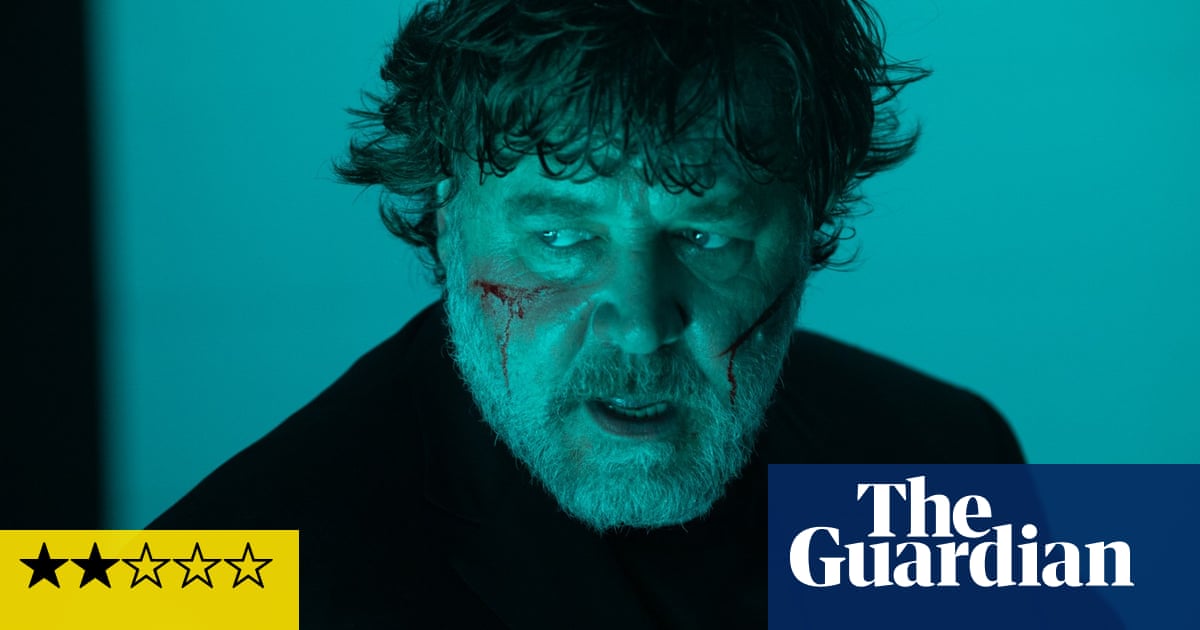Like many other dethroned A-listers of his generation, Oscar winner Russell Crowe has found himself a steady career hustling far further down the food chain, headlining B-movies he once would have balked at. The last few years have seen the famed actor crop up in gonzo road rage thriller Unhinged, shepherd the other Hemsworths in war drama Land of Bad, lead the barely released crime thriller Sleeping Dogs earlier this year and become the pope’s exorcist in The Pope’s Exorcist.
The latter became something of a surprise hit, first theatrically and then on Netflix, albeit in a rather jokey way, the film most easily remembered for the many memes of Crowe on a scooter. Its success was such that it not only guaranteed a sequel (The Pope’s Exorcist 2 is coming), but it also led to another of his exorcism movies getting saved from streaming hell and being delivered to the big screen instead, this weekend’s The Exorcism, a film originally shot back in 2019. It has an interesting backstory, loosely inspired by director Joshua John Miller’s experience as the son of actor Jason Miller who played Father Karras in The Exorcist. His father’s tales of a haunted set led to a film about an actor starring in a remake of what appears to be The Exorcist then becoming more explicitly plagued by demonic forces during production.
Originally titled The Georgetown Project, the name of the film within a film, it was given a sniffy reception by backers Miramax but planned reshoots were then paused when Covid happened. It was left on the shelf until the success of The Pope’s Exorcist last year led to a jumpstart with new scenes and even new actors added. But still Miramax didn’t approve and sold it last-minute to Vertical and with a strike-affected summer schedule, a theatrical release was seen as a smart idea. “I guess you could say the movie was cursed,” Miller said at a low-key premiere earlier this month. “At one point it almost didn’t get finished.”
What we’re left with is predictably scrappy, war wounds out for all to see, a cursed movie about a cursed production that ends up being a cursed viewing experience, a shame as there is something initially compelling about the conceit. Despite so many horror films suffering from on-set horrors, it’s a mostly unexplored phenomenon on-screen and it makes the first act feel fresher than what we’ve become accustomed to in an overly busy and overly stagnant subgenre. Produced by Scream writer-producer Kevin Williamson, who knows a little something about meta-horror, there’s a smartly conceived, if ultimately mishandled, cold open that follows an actor rehearsing a scene that ends up killing him. His death makes room for Tony (Crowe), a once-esteemed star who lost his way after alcoholism took over, to mount his comeback.
Playing a man of God who helps a mother save her daughter from the devil, Tony is forced to reckon with his past, growing up as a boy who, like many, was taken advantage of by a priest. As the shoot begins, Tony’s clouded mind starts to affect the movie, haunted by abuse, addiction and, you guessed it, something far darker.
But while the early stages of his descent into hell are intriguing, Miller and co-writer MA Fortin fumble the bad to worse, plagued by pacing issues, rushing through familiar WTF moments as nosebleeds turn to darkened veins. We just don’t get enough of Tony’s rising inner panic and instead he quickly becomes just some monster, a tool for jump scares, a strangely insubstantial and superficial waste given how personal the film apparently is. Crowe tries and there’s something admirable to such commitment even in his schlockier movies, but with his character quickly devolving into full-on silliness, he’s left underserved. His daughter, played by Fear Street’s Ryan Simpkins, becomes more of a protagonist but her scenes are choppily handled, especially those with a barely etched love interest played by Chloe Bailey.
As the film sinks into its unholy final act, production hell really comes into full view and we watch in horror as those must have in the nightmarish editing suite, trying to make sense out of nonsense. Where did he, how did they, what was that – in a film that should feel claustrophobic, a tight focus on one man’s downfall, we’re too busy asking questions to stay in the moment and such confusion takes us further and further away. The ending, all deafening sound and fury, could be from any old exorcism movie, Miller’s early attempt to say something about the monstrousness of addiction and the horror of abuse thrown aside for a high-volume and low-impact whirlwind of screaming and stabbing. He is a far better director than he is a writer though, and the film is crisply, thoughtfully made, at the least looking like it belongs on the big screen.
Perhaps at some stage on this tortuous journey, when the vision was clearer and the destination visible, there was a version of The Exorcism that might have felt worth the herculean effort it took to make it. What crawled its way to us is instead just a cursed curio, a film less interesting than its Wikipedia page.

